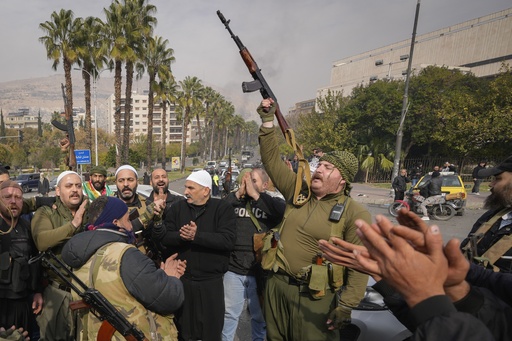
Despite instances of violence erupting in the aftermath of Assad’s exit, it has not escalated to the levels that many had anticipated after enduring nearly 14 years of civil conflict. Much of the credit for this relative tranquility is attributed to Hayat Tahrir al-Sham (HTS), the Islamic militant group that spearheaded the rebellion against Assad and is now actively involved in efforts to reconstruct the nation and foster unity among its diverse populace. Although HTS has links to al-Qaida, it has publicly committed to treating all faiths and ethnicities fairly and has denounced the practice of revenge killings.
In the wake of Assad’s departure, reports from activists and specialists monitoring the situation indicate that dozens have fallen victim to acts of vengeance, emphasizing that the majority of these casualties are from the Alawite community, a sect of Shia Islam to which the Assad family belongs. While the critical role of Alawites in Assad’s oppressive regime led experts to foresee widespread sectarian violence, HTS has intervened to alleviate tensions in communities marred by revenge attacks, looting, and other forms of harassment. Local activists have noted these efforts, though experts maintain a watchful eye on the long-term viability of peace and coexistence.
“Repayments for past wrongs have been comparatively low so far,” remarks Hilal Khashan, a political science scholar at the American University of Beirut. “We hope this cycle of violence doesn’t escalate into broader civil conflict.”
During the Assad family’s half-century of dictatorial control, members of the Alawite sect occupied numerous high-ranking roles within the military and security apparatus, which oversaw a network of prisons notorious for the torture and execution of those accused of dissent. The HTS-led transitional government has committed to gathering evidence and conducting trials in a specialized court against former officials associated with Assad’s infamous prisons. Additionally, amnesty has been promised to certain government employees and former military personnel, many of whom have begun to disarm voluntarily.
“To lay the groundwork for societal peace, we must prioritize justice, which can only emerge through accountability,” asserts Obeida Arnaout, a representative for the interim government. “Those with blood on their hands will not receive any leniency.”
The interim government has called for reconciliation among Syria’s diverse ethnic groups, primarily Arabs and Kurds, while fostering respect across various religious communities. Of Syria’s 23 million residents, Sunnis constitute about three-quarters, while Alawites make up roughly ten percent, with the remainder comprised of Christians, Ismaili Shiites, and Druze.
Under Assad’s rule, Syrians experienced a degree of religious and social freedoms, with individuals of all genders freely interacting in public spaces, and women participating prominently in governmental leadership. With HTS now in control, concerns have arisen regarding the potential shift towards a theocratic regime.
So far, however, HTS has not enforced any stringent religious mandates, such as imposing dress codes on women, and has allowed international journalists to operate without obstruction. Over its years of governance in northwest Idlib province, HTS has permitted Christians and Druze to practice their faiths without interference.
HTS is led by Ahmad al-Sharaa, a former al-Qaida member who has distanced himself from extremism and has worked to cultivate an image centered on pluralism and tolerance. Nevertheless, the U.S., along with other Western nations and the U.N., continues to categorize HTS as a terrorist group directly stemming from al-Qaida. One of al-Sharaa’s principal ambitions is to have this designation revoked, which may subsequently result in the lifting of economic sanctions against Syria.
U.S. officials have acknowledged al-Sharaa’s public affirmations about safeguarding minority and women’s rights but remain cautiously skeptical regarding his commitment to uphold these promises over time. Secretary of State Antony Blinken expressed the U.S. interest in supporting HTS and emphasized their desire for success for the Syrian people.
Following Assad’s flight from power, at least 72 individuals have lost their lives to sectarian-related violence, particularly across four regions known for their religious diversity: Hama, Homs, Tartus, and Latakia. Notably, on December 9, armed assailants invaded the village of Bahra in Hama province, resulting in the deaths of multiple Alawites. As news spreads, the affected areas are witnessing notable depopulation as locals flee to the Alawite stronghold of Tartus.
In Masyaf, a stronghold of Assad’s regime, assailants kidnapped a prominent local figure, emboldening fears among residents about ongoing violence. Tension persisted in the area until HTS convened a meeting with local dignitaries to foster dialogue and pave the way for peace.
“During Assad’s regime, we too were victims,” noted an Alawite resident involved in the discussions. He illustrated how the government’s refusal to provide civilian job opportunities forced many to enlist in the military or security services.
Reports suggest that al-Sharaa has taken proactive measures to maintain peace between the various factions in Syria. Recently, he convened with a Druze delegation in Damascus, reiterating his commitment to unification and the establishment of a free society within Syria.
Some observers believe that the potential for increased sectarian hostility following Assad’s overthrow was mitigated by the lack of a determined military response from his forces against HTS and other militant groups. Instead, many of Assad’s troops effectively abandoned their posts, opting not to defend the regime.
“While isolated sectarian incidents are occurring, they are largely confined to individual acts,” remarked Rayan Maarouf, an activist from the Druze minority in southern Sweida.
